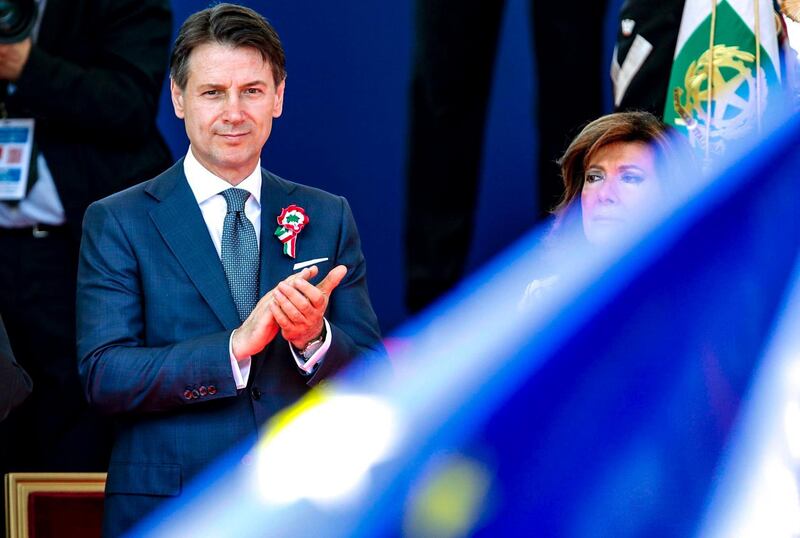Three days after being sworn in, Italy’s new populist government is preparing for what it considers the final hurdle before it sets about trying to overhaul European Union rules and the established order - a confidence vote in both houses of parliament.
Parliamentary approval will be sought this week for the 18-member cabinet of Prime Minister Giuseppe Conte, a 53-year-old law professor with no political experience. The anti-establishment Five Star Movement and the anti-immigrant League currently hold a majority in both houses, although in the 320-seat senate the two groups only have 14 votes more than the opposition.
Mr Conte signalled his conviction that the votes will not be a problem, saying in a Facebook post that he would hold a bilateral meeting with German Chancellor Angela Merkel at the summit of Group of Seven nations in Canada on June 8 and 9.
While this first vote is likely to go smoothly as the parties have already agreed on the list of ministers and government programme, some analysts predict difficult times in future parliamentary ballots as the two parties spar over which of their expensive electoral promises to keep first.
__________
Read more:
Italy's Salvini in Sicily to push new hard line on migration
Editorial: Italy's battle for political stability is far from over
Italy's eurosceptics and their currency ideas take centre-stage
__________
"The coalition parties have different constituencies and different requirements from the budget," which could led to a renewed political crisis in the medium to short term, financier George Soros wrote in an op-ed published in newspaper Corriere della Sera on Sunday. "The government may well fall, so we may be facing elections later this year or more likely early next year."
On Sunday, Five Star leader Luigi Di Maio said a universal basic income for poorer Italians will be among the first measures he plans to put before the parliament. League’s leader Matteo Salvini, who has promised voters hefty tax cuts, at the weekend said that he plans to cut €5 billion (Dh21.5bn) worth of assistance to asylum seekers in order to recover funds to keep his electoral pledges.
Yet the sum is small compared with the implementation of the full Five Star and League programme, which also includes scrapping a pension reform that had helped balance Italy’s precarious finances during the economic crisis. Corriere della Sera estimated the cost of the populist programme at as much as €100bn. That is ambitious for Italy, which has the second-highest debt burden in Europe after Greece, and one that could put it on a collision course with the eurozone’s fiscal disciplinarians.
The announcement of the government plan alarmed markets last week and sparked tensions with Italian President Sergio Mattarella, almost scuppering the chance of forming a government. The spread between Italian and German 10-year bonds widened to 290 basis points on May 29 when concerns about the programme added to speculation over the possible appointment of 81-year-old euroscepticc economist Paolo Savona as finance minister. The post went eventually to economist Giovanni Tria, 69, calming markets, with Mr Savona being made responsible for European affairs.
“The worst-case scenario was avoided but uncertainty remains,” Kepler Cheuvreux analyst Marco Baccaglio wrote in a note on Friday. A weak majority in the senate might undermine the sustainability of the government and the cost of the plan “cannot be forgotten”.






